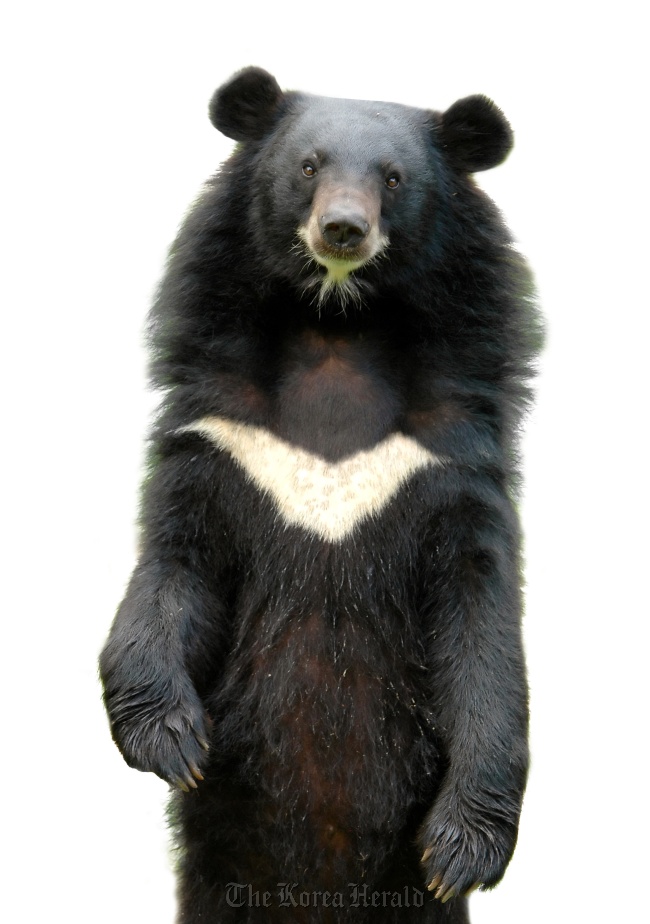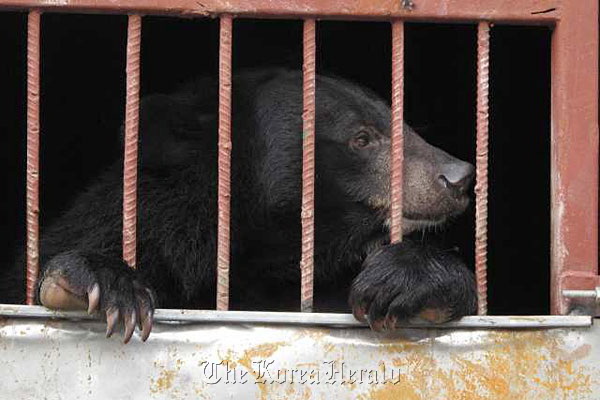
The Asiatic black bear is commonly called moon bear for its large, white crescent-shaped mark on its chest. It is listed as vulnerable on the IUCN Red List of Threatened Species. (123rf)
In July, two bears were shot dead by hunters hired by the police, after they escaped from a farm in Yongin in the outskirts of Seoul. They were among about 100 Asiatic black bears on the farm, locked up in sweltering, cramped steel cages.
Three months prior to that, another bear had run away from the farm and faced the same fate.
Asiatic black bears, or moon bears, are a globally endangered species. The Korean government has been trying for years to save them from the brink of extinction. Since it started reintroducing the animal into the wild in Jirisan in 2001, the wild bear population is believed to have grown to 27 in Korea. On 56 private firms throughout the country, however, there are over a thousand of them.

A bear locked up in a cage in a Chinese farm. (AP)
Bear farming is a growing headache for officials in Korea, with both farmers and animal rights groups pressuring them to do something to end an ironic situation.
“We have commissioned a study of bear farming in Korea, which should be completed this month. Based on the findings, we will draw up comprehensive measures,” said an official at the Ministry of Environment, which oversees bear farms in Korea.
Bear farming started early 1980 in Korea. It was none other than the government which introduced it as a promising new business for livestock farmers.
Bears were imported from overseas for reproduction and the extraction of bile, a digestive juice produced by the liver and stored in the gall bladder. Bear bile has been used for thousands of years in Asia to treat fevers, pain, inflammation and many other ailments.
A few years later, however, amid growing international and domestic awareness on protection of endangered species, the government banned the imports of the animal. By 1993, exports were also forbidden.
Over time, regulations tightened on the slaughtering and sale of bear parts and market demand for bear bile declined, with public awareness on animal cruelty improving.
Under current laws, bears on farms can be legally slaughtered once they reach a minimum of 10 years of age for sale of gall bladders and other parts.
Yet, slaughtering stopped years ago, due to lack of demand, bear farmers say.
“There is nothing we can do with these bears. No market at all,” a farm owner complained in an interview with a local TV network. “I am feeding them, because I can’t just let them starve to death.”
They demand the authorities purchase the bears, just like the Vietnamese government did in 2005 to outlaw bear farming.
Animal rights groups are also targeting Korea, one of the only two countries in the world that permits bear farming for bile extraction. The other is China, where over 10,000 bears are believed to be on farms.
On Jeju this week, the International Union for Conservation of Nature, the world’s oldest and largest environmental network, will vote on a motion to urge the Korean government to stop bear farming.
If approved, the motion, though not legally binding, will add more pressure on the government to move toward the phase-out.
“The (Korean) government has no excuse; it must act now to protect the bears,” said Chris Gee, external affairs manager for the World Society for the Protection of Animals.
By Lee Sun-young (
milaya@heraldcorp.com)




![[KH Explains] No more 'Michael' at Kakao Games](http://res.heraldm.com/phpwas/restmb_idxmake.php?idx=645&simg=/content/image/2024/04/28/20240428050183_0.jpg&u=20240428180321)


